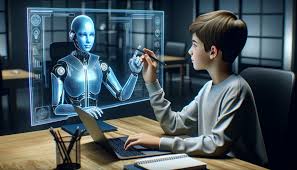In the fast-changing world of education, technology is playing a bigger role than ever before, and artificial intelligence is at the center of this transformation. Among its most powerful applications is the rise of AI tutors—intelligent systems that can adapt to the individual learning needs of every student. Unlike traditional classroom teaching, where one teacher is responsible for many students at once, AI tutors can offer a personalized learning experience that meets each learner at their own level. This new approach is not about replacing teachers but about supporting them, enhancing the learning experience, and giving every student the attention they deserve.
One of the biggest advantages of AI tutors is their ability to provide personalized learning. Every student learns differently—some grasp concepts quickly, while others need more time and practice. In a traditional classroom, it’s difficult for a teacher to give each student individual attention due to limited time and resources. AI tutors solve this problem by analyzing how students learn, identifying their strengths and weaknesses, and adapting lessons accordingly. For example, if a student struggles with a particular math concept, the AI tutor can offer more practice problems, explain the topic in different ways, and give instant feedback to help the student improve. On the other hand, if a student quickly understands a concept, the AI can move them ahead to more advanced topics, ensuring they stay challenged and engaged.
Another powerful aspect of AI tutors is real-time feedback. In many learning environments, students have to wait for a teacher to grade assignments or provide corrections, which can slow down their progress. With AI tutors, feedback is instant. If a student makes a mistake, the system can immediately explain what went wrong and offer guidance on how to correct it. This immediate feedback helps students learn faster, build confidence, and avoid repeating the same mistakes. It also allows learners to take more control of their education, becoming more independent and proactive.
AI tutors can also make learning more engaging. Many students struggle to stay focused during long lectures or repetitive lessons. AI-powered systems can turn learning into an interactive experience through quizzes, games, simulations, and personalized challenges. These tools make learning enjoyable and motivate students to keep going. Instead of being passive listeners, students become active participants in their education, which improves understanding and retention.
Another major benefit of AI tutors is accessibility. Not all students have access to quality education, especially in remote or underprivileged areas. AI tutors can bring high-quality, personalized education to anyone with an internet connection. Whether a student is in a big city or a small village, they can receive the same level of academic support. This helps bridge the gap between different communities and creates more equal opportunities for learning. Moreover, AI tutors are available 24/7, unlike traditional classrooms that operate on fixed schedules. Students can learn at their own pace, at any time, without pressure or stress.
Teachers also benefit from AI tutors. Instead of spending all their time on repetitive tasks like grading or answering basic questions, teachers can focus on creative, strategic, and emotional aspects of teaching that AI cannot replace. AI tutors can track students’ progress, highlight areas where they are struggling, and provide teachers with valuable insights. This makes it easier for teachers to design better lessons, give targeted support, and help students reach their full potential. AI acts as an intelligent assistant, making the classroom more efficient and effective.
AI tutors are also helping students develop essential 21st-century skills such as critical thinking, problem-solving, and self-learning. By giving students control over their learning journey, AI encourages them to take responsibility for their growth. When students can choose the pace and path of their learning, they become more independent and motivated. This prepares them for real-world situations, where continuous learning and adaptability are crucial skills.
Another interesting advantage of AI tutors is their ability to support diverse learning needs. Students with learning disabilities, language barriers, or different cultural backgrounds often face challenges in traditional classrooms. AI tutors can adapt lessons to meet these unique needs, ensuring no student is left behind. For example, they can offer text-to-speech support for students with reading difficulties or provide language translations for learners in multilingual environments. This level of personalization makes education more inclusive and supportive for all students.
AI tutors are also making assessments more accurate and meaningful. Traditional exams often measure only memorization skills, and many students experience stress and anxiety around testing. AI-based assessments can evaluate a student’s understanding in real time, without putting pressure on them. Instead of one big exam, AI can track learning progress continuously, offering a more complete and fair picture of a student’s abilities. This not only reduces stress but also helps students learn more effectively.
However, while AI tutors bring many opportunities, they also come with challenges. One concern is the over-reliance on technology. Students still need human interaction to build social skills, emotional intelligence, and creativity. AI cannot replace the empathy, encouragement, and understanding that teachers provide. It’s important to strike a balance where AI supports the learning process without replacing the essential human elements of education.
Another challenge is data privacy and security. AI tutors rely on collecting and analyzing large amounts of student data to personalize learning. Schools and developers must ensure that this data is kept safe and used responsibly. Transparent policies, strong security systems, and ethical guidelines are necessary to protect students’ privacy.
Additionally, there’s a need to ensure equal access to AI tools. While AI can make education more inclusive, not all students have access to the internet or smart devices. To truly make a difference, governments, organizations, and schools must work together to close the digital divide and provide technology to those who need it most.
Despite these challenges, the potential of AI tutors in transforming education is undeniable. They are already helping students around the world learn faster, retain more knowledge, and enjoy the learning process. As technology continues to advance, AI tutors will become even smarter and more capable of providing a personalized learning experience to every student.
The role of teachers will also evolve in this new era of education. Instead of being the sole source of knowledge, teachers will become facilitators and mentors, guiding students as they learn with the help of AI. This combination of human expertise and artificial intelligence has the power to create a truly personalized, efficient, and inspiring learning environment.
AI tutors also support lifelong learning. Education is no longer limited to the classroom or specific age groups. With AI tutors, anyone—whether a child, a college student, or a working professional—can continue learning at their own pace. This flexibility is essential in a world where skills and industries are constantly evolving. People can learn new skills, upgrade their knowledge, and stay relevant in their careers.
Another exciting aspect is how AI tutors can break language and cultural barriers. A student in one country can learn from an AI system developed in another, with lessons adapted to their language and learning style. This global exchange of knowledge creates a more connected and informed world.
As AI becomes more advanced, the learning experience will continue to improve. AI tutors will be able to understand not only what students are learning but also how they feel while learning. Emotion recognition and adaptive teaching strategies will allow these systems to provide support when students feel frustrated or unmotivated, making learning more human and empathetic.
In the future, we can expect classrooms to be more dynamic, with AI tutors working hand in hand with human teachers to create engaging, effective, and personalized learning experiences. Education will no longer be one-size-fits-all; it will be a journey designed for each individual. This shift has the power to unlock the potential of millions of students worldwide, giving them the tools, confidence, and knowledge they need to succeed.
AI tutors represent a new era of education—one where every student receives the attention they deserve, where learning is fun, interactive, and accessible, and where teachers can focus on inspiring rather than just instructing. The path forward requires collaboration, responsibility, and innovation, but the destination promises a more inclusive and effective education system for everyone.



